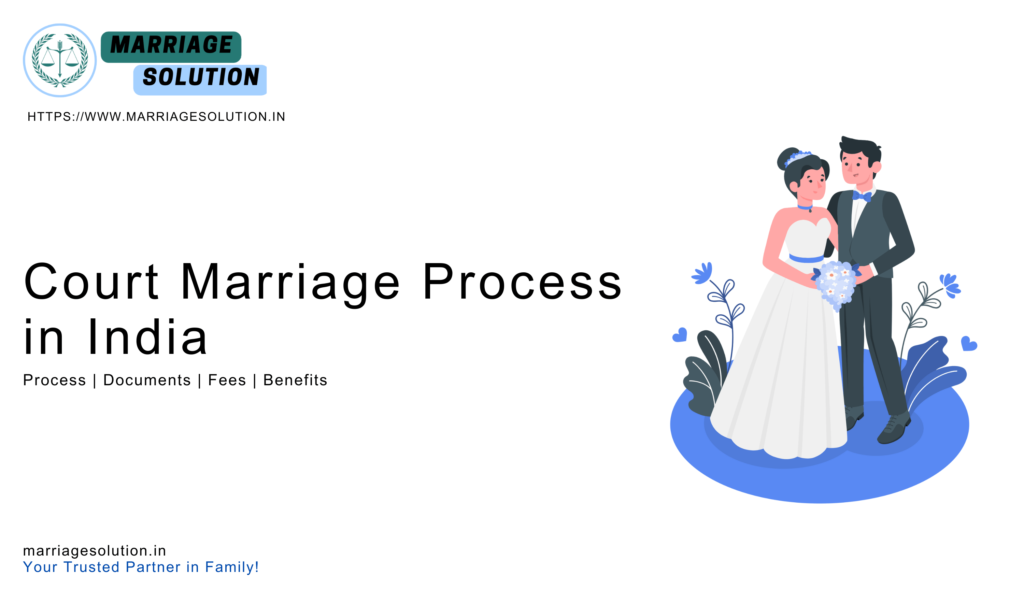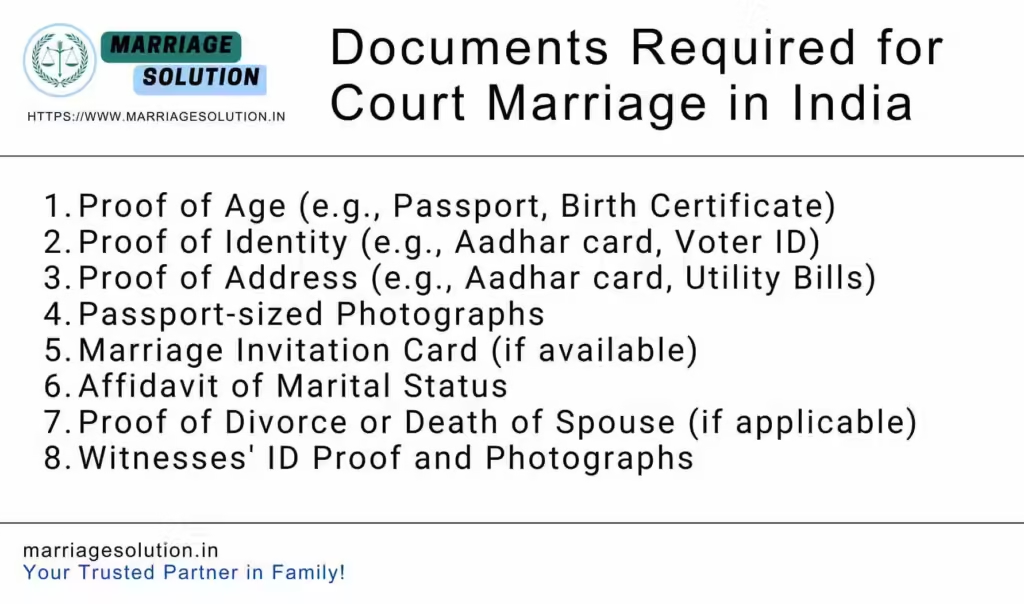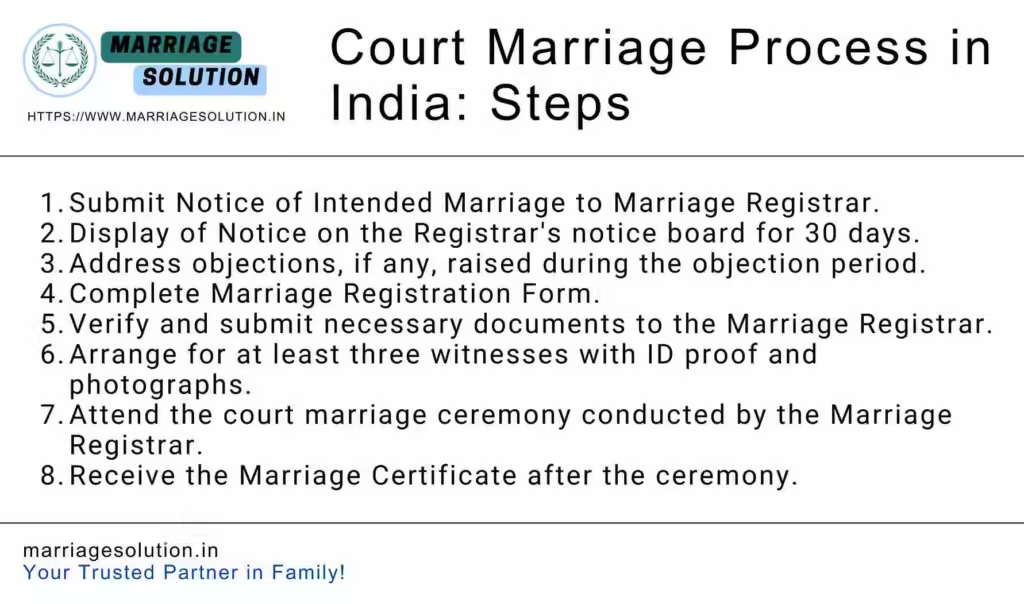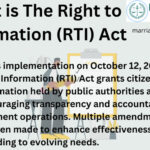
Introduction
Court marriage, also known as civil marriage, is a legal union between two individuals conducted and solemnized by a court of law, typically without any religious customs or ceremonies. This process provides a straightforward and efficient means for couples to formalize their marital status, emphasizing legal and contractual aspects over religious or cultural considerations. Court marriages are often favored for their simplicity, affordability, and inclusivity, allowing couples from different backgrounds or beliefs to enter into a legally recognized union. The procedure typically involves obtaining a marriage license, appearing before a magistrate or a designated official in a court setting, and having the marriage registered according to the legal requirements of the jurisdiction. This alternative to traditional religious or cultural ceremonies is chosen by many couples seeking a more secular and legal approach to marriage.
- Introduction
- What is Court Marriage ?
- Benefits of Court Marriage
- Conditions for Court Marriage
- Documents Required for Court Marriage in India
- Court Marriage Process in India
- Court Marriage Fee in India
- Advantages of Court Marriage
- Difference between Court Marriage and Registered Marriage
- If you require assistance with court or any other marriage.
- FAQs
What is Court Marriage ?
Court marriage refers to a legal procedure where a couple gets married in a court of law, typically without any religious or traditional ceremonies. It is a civil ceremony that is recognized by the government as a valid marriage. In a court marriage, the couple applies for a marriage license from the local government or court, and once the legal requirements are met, they can have a simple ceremony conducted by a government official or a designated person such as a magistrate or a justice of the peace.
Court marriages are often chosen by couples who prefer a straightforward and legally binding union without the need for elaborate religious or cultural rituals. It provides a legally recognized framework for the relationship, and the marriage certificate issued after the ceremony serves as proof of the marriage. The process and requirements for court marriages may vary by jurisdiction, so couples typically need to follow the specific procedures set by the local authorities.
Benefits of Court Marriage
Court marriage offers several benefits, which contribute to its popularity among couples. Here are some advantages:
- Legal Recognition: Court marriages are legally recognized, providing the couple with the rights and responsibilities that come with marriage under the law.
- Simplicity: The process of court marriage is generally simpler and more straightforward than traditional ceremonies. It involves minimal rituals and paperwork.
- Time and Cost Efficiency: Court marriages are typically more time and cost-effective compared to elaborate traditional weddings. There are fewer expenses associated with ceremonies, receptions, and other traditional wedding components.
- Privacy: Court marriages are conducted in a more private setting, reducing the need for a large guest list or public celebration. This can be beneficial for couples who prefer a more intimate and personal experience.
- No Need for Social Approval: Unlike traditional weddings, court marriages do not require public or social approval. Couples can choose to marry without the need for elaborate ceremonies or societal expectations.
- Legal Documentation: Court marriages provide a formal marriage certificate issued by the government, which serves as legal proof of the marriage. This document is often required for various legal purposes, such as visa applications, joint financial accounts, and more.
Conditions for Court Marriage
The conditions for court marriage in India may vary slightly depending on the state and the specific laws in place. However, there are some common requirements that couples generally need to fulfill. Here are the typical conditions for court marriage in India:
- Age Requirement:
- The legal age for marriage in India is 18 years for brides and 21 years for grooms. Both parties must meet these age requirements.
- Mental Capacity:
- Both individuals must be mentally sound and capable of understanding the nature of marriage and its consequences.
- No Existing Marriage:
- Neither party should have a spouse living at the time of marriage. If either party has been previously married, they must provide evidence of the termination of the previous marriage (e.g., divorce decree or death certificate).
- Consent:
- Both individuals must willingly and without any coercion or undue influence consent to the marriage.
- Notice of Intended Marriage:
- In many states, a notice of intended marriage is required to be given to the Marriage Registrar of the district where either of the parties has resided for at least 30 days prior to the notice. The notice is usually displayed on the notice board of the office.
- Witnesses:
- The presence of at least three witnesses is usually required during the court marriage ceremony. These witnesses must have valid identification and be present at the time of registration.
- No Prohibited Relationships:
- The parties should not be within the prohibited degree of relationship. The relationships that are considered prohibited vary based on personal laws and customs.
- Documentary Evidence:
- Both individuals need to provide certain documents as proof of identity, age, and address. Common documents include:
- Passport or Voter ID
- Birth certificate
- Residential proof (e.g., utility bills)
- Passport-sized photographs
- Both individuals need to provide certain documents as proof of identity, age, and address. Common documents include:
- Registration:
- The marriage must be registered under the relevant Marriage Acts, such as the Hindu Marriage Act, Special Marriage Act, or others, depending on the religious affiliation of the parties.
- Waiting Period:
- Some states may have a stipulated waiting period after the notice of intended marriage is filed before the marriage can be solemnized. This waiting period allows for any objections to be raised.
Documents Required for Court Marriage in India

These are the following documents required for court marriage in India:
- Proof of Age and Identity for Both Parties:
- Passport
- Birth certificate
- Voter ID card
- Driving license
- Proof of Address for Both Parties:
- Aadhar card
- Utility bills (electricity, water, gas) in the name of either of the parties
- Passport
- Passport-sized Photographs:
- Recent passport-sized photographs of both the bride and groom
- Marriage Invitation Card (if available):
- Some states may request a copy of the marriage invitation card, if applicable.
- Affidavit of Marital Status:
- An affidavit affirming the marital status of both parties and confirming that there is no existing spouse.
- Proof of Divorce or Death of Spouse (if applicable):
- In case either party has been previously married, documents such as the divorce decree absolute or the death certificate of the spouse may be required.
- Witnesses and their ID Proof:
- The presence of at least three witnesses is usually required. Witnesses must provide identification proof (e.g., passport, voter ID, Aadhar card).
- Passport-sized Photographs of Witnesses:
- Recent passport-sized photographs of the witnesses.
- Affirmation that the Parties are not Related:
- An affirmation stating that the parties are not within the prohibited degree of relationship.
- Proof of Notice of Intended Marriage:
- A copy of the notice of intended marriage submitted to the Marriage Registrar, along with the receipt of payment of the prescribed fee.

Court Marriage Process in India
- Notice of Intended Marriage:
- The process usually begins with the submission of a notice of intended marriage to the Marriage Registrar of the district where either party has resided for at least 30 days prior to the notice. The notice includes details such as the name, age, address, and marital status of both parties, as well as the intended date of marriage.
- Publication of Notice:
- After the notice is submitted, it is usually displayed on the notice board of the Marriage Registrar’s office for a specified period, typically 30 days. This is to allow for any objections to the marriage to be raised by the public.
- Objection Period:
- During the 30-day period following the publication of the notice, objections can be raised against the marriage by any person who has a valid reason to do so. The Marriage Registrar investigates any objections and decides whether to allow or reject the marriage.
- Marriage Registration Form:
- Once the objection period has passed without any objections or after resolving any objections raised, the parties can fill out and submit the marriage registration form provided by the Marriage Registrar. This form includes details such as personal information, address, occupation, marital status, etc.
- Verification of Documents:
- The parties need to submit various documents as per the requirements of the Marriage Registrar. These documents typically include proof of age, identity, address, marital status, and any other documents specified by the registrar.
- Witnesses:
- The presence of at least three witnesses is required during the court marriage ceremony. The witnesses must have valid identification and be present at the time of registration.
- Court Marriage Ceremony:
- After the completion of all formalities and document verification, the court marriage ceremony takes place in the presence of the Marriage Registrar and witnesses. The ceremony is usually brief and straightforward, involving the exchange of vows and signing of the marriage register.
- Marriage Certificate:
- Upon completion of the ceremony, the Marriage Registrar issues a marriage certificate to the couple. This certificate serves as legal proof of marriage and is essential for various legal purposes such as visa applications, opening joint bank accounts, etc.
- Registration of Marriage:
- The marriage is officially registered under the relevant Marriage Act, such as the Hindu Marriage Act, Special Marriage Act, or others, depending on the religious affiliation of the parties.
Court Marriage Fee in India
The fee for court marriage in India differs for different state. But typical fee is around Rs. 550 to Rs. 1100.
Advantages of Court Marriage
- Legal Recognition:
- Court marriages are legally recognized, providing the couple with the rights and responsibilities associated with marriage under the law. The marriage certificate issued after the ceremony serves as official proof of the marital union.
- Simplicity and Efficiency:
- The process of court marriage is generally simpler and more efficient than traditional weddings. It involves fewer rituals, paperwork, and ceremonies, making it a quicker and more straightforward option for couples.
- Secular Nature:
- Court marriages are often secular and do not involve religious ceremonies. This is advantageous for couples from diverse religious backgrounds or those who prefer a neutral, non-religious approach to their marriage.
- Privacy:
- Court marriages offer a more private and intimate setting. The ceremony takes place in the presence of the couple, witnesses, and the marriage registrar, reducing the need for a large guest list or public celebration.
- Cost-Effective:
- Court marriages are generally more cost-effective compared to elaborate traditional weddings. Couples can save on expenses related to venue rentals, catering, decorations, and other aspects associated with traditional ceremonies.
- Flexibility and Convenience:
- Court marriages often provide flexibility in choosing the date and time of the ceremony. Couples can schedule the marriage at a time that is convenient for them and the marriage registrar. This flexibility is beneficial for those with busy schedules or specific preferences for the wedding date.
Difference between Court Marriage and Registered Marriage
| Sr. No. | Feature | Court Marriage | Registered Marriage |
|---|---|---|---|
| 1 | Venue | Typically takes place in a court or office of the Marriage Registrar. | Can take place in a court or any place agreed upon by the parties, including religious institutions. |
| 2 | Ceremony | Involves a simple and brief ceremony conducted by a Marriage Registrar. | May involve additional traditional or religious ceremonies, depending on the couple’s preferences. |
| 3 | Procedure | Generally has a simplified and expedited procedure, with minimal rituals. | May involve more elaborate procedures and ceremonies, depending on cultural or religious traditions. |
| 4 | Privacy | Offers a more private and intimate setting with fewer guests. | Depending on the chosen venue, may have a more public or elaborate celebration with a larger audience. |
| 5 | Requirements | Usually requires a notice of intended marriage, document verification, and witness presence. | May have additional requirements based on the chosen venue, such as specific religious or cultural rituals. |
| 6 | Cost | Typically more cost-effective as it involves fewer ceremonies and expenses. | May be more expensive due to additional ceremonies, venue costs, and traditional customs. |
| 7 | Flexibility | Generally offers flexibility in choosing the date and time of the ceremony. | May have less flexibility due to the involvement of traditional ceremonies or specific religious requirements. |
| 8 | Legal Recognition | Provides legal recognition through the issuance of a marriage certificate. | Also provides legal recognition with the issuance of a marriage certificate, but the process may vary based on the chosen venue. |
If you require assistance with court or any other marriage.
court or any other marriage-related issues, our Home – MarriageSolution.in: Your Trusted Partner in Family Legal Matters. Law Services, IPC Section blog, Expert Advice, court cases lawyer help. website may prove helpful. By completing our enquiry form and submitting it online, we can provide customized guidance to navigate through the process effectively. Don’t hesitate to contact us for personalized solutions; we are here to assist you whenever necessary!
What is Article 371 of Indian Constitution ?
FAQs
What is court marriage, and how is it different from a traditional wedding?
Court marriage is a legal process where a couple gets married in a court of law, without elaborate religious or traditional ceremonies. It is different from a traditional wedding in its simplicity and focus on legal recognition.
What are the eligibility criteria for court marriage in India?
Eligibility criteria typically include being of legal age (18 years for brides, 21 years for grooms), mental soundness, no existing marriage, and compliance with any other requirements set by the local Marriage Registrar.
How long does the court marriage process take?
The duration can vary, but the court marriage process usually takes a few weeks, including the notice period and any waiting periods specified by local regulations.
Do we need to publish a notice for court marriage, and why?
Yes, in many cases, a notice of intended marriage needs to be submitted to the Marriage Registrar and displayed on the notice board for a specified period. This allows for any objections to be raised.
What documents are required for court marriage, and how should we prepare for it?
Commonly required documents include proof of age, identity, address, marital status, and passport-sized photographs. It’s advisable to contact the local Marriage Registrar for the precise list of documents and procedures.
Can we choose any date and time for the court marriage ceremony?
In many cases, court marriages offer flexibility in choosing the date and time of the ceremony, allowing couples to schedule it at their convenience.
Is court marriage valid in all countries for international couples?
Court marriages are generally valid internationally, but it’s advisable to check the specific requirements of the destination country and consider additional documentation such as apostille or legalization if needed.
What legal benefits come with a court marriage?
A court marriage provides legal recognition, rights, and responsibilities to the married couple. The marriage certificate issued serves as proof of marriage and is essential for various legal purposes, such as visa applications and joint financial transactions.
- AFSPA Act
 AFSPA act mean Armed Forces Special Powers Act (AFSPA) grants special powers to the Indian Armed Forces in areas classified as “disturbed” due to significant insurgency or internal disturbances.
AFSPA act mean Armed Forces Special Powers Act (AFSPA) grants special powers to the Indian Armed Forces in areas classified as “disturbed” due to significant insurgency or internal disturbances. - Right to Information RTI act :Your Comprehensive Guide (Part 1)
 The Right to Information (RTI) Act : Explore the essence of the Right to Information (RTI) Act through this symbolic image. The image features legal documents, emphasizing the importance of transparency and accountability in governance. The scales of justice represent the balance achieved through the citizens’ right to access information.
The Right to Information (RTI) Act : Explore the essence of the Right to Information (RTI) Act through this symbolic image. The image features legal documents, emphasizing the importance of transparency and accountability in governance. The scales of justice represent the balance achieved through the citizens’ right to access information. - What is Article 371 of Indian Constitution ?Article 371 of the Indian Constitution grants special provisions to specific states and regions within India, addressing their unique historical, social, and cultural circumstances. These provisions aim to accommodate diverse needs and protect cultural identities within the constitutional framework.
- Indian Labour law : Your Comprehensive Guide (Part 1)
 The purpose of labour laws is to safeguard employees and guarantee equitable treatment at the workplace, encompassing aspects such as remuneration, security, and perks. These regulations establish a secure ambiance by imposing minimum wage requirements, ensuring factory safety measures are implemented effectively while granting rights like maternal leave entitlements. Abiding by these principles promulgates an impartial work culture encapsulating upright conduct; thereby cultivating conducive surroundings for progressive development.
The purpose of labour laws is to safeguard employees and guarantee equitable treatment at the workplace, encompassing aspects such as remuneration, security, and perks. These regulations establish a secure ambiance by imposing minimum wage requirements, ensuring factory safety measures are implemented effectively while granting rights like maternal leave entitlements. Abiding by these principles promulgates an impartial work culture encapsulating upright conduct; thereby cultivating conducive surroundings for progressive development. - GST :Your Comprehensive Guide (Part 1 – Understanding the Basics)
 The Goods and Services Tax (GST) is like a big change in how we pay taxes in India. It started on July 1, 2017, and it’s here to simplify things. Before GST, we had many different taxes, and it could get confusing. Now, with GST, it’s like combining all those taxes into one. The idea is to make taxes more straightforward, clear, and fair for everyone. It applies to almost everything we buy or sell, and it’s helping India’s businesses and economy work better together. So, GST is not just a tax change; it’s a step towards making things simpler and better for all of us.
The Goods and Services Tax (GST) is like a big change in how we pay taxes in India. It started on July 1, 2017, and it’s here to simplify things. Before GST, we had many different taxes, and it could get confusing. Now, with GST, it’s like combining all those taxes into one. The idea is to make taxes more straightforward, clear, and fair for everyone. It applies to almost everything we buy or sell, and it’s helping India’s businesses and economy work better together. So, GST is not just a tax change; it’s a step towards making things simpler and better for all of us.
